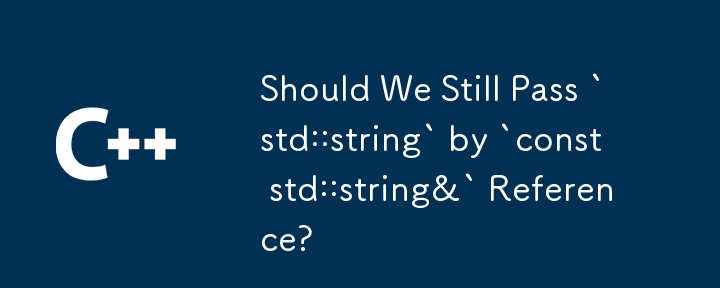Should We Still Pass `std::string` by `const std::string&` Reference?
Dec 10, 2024 am 12:27 AM
The Obsolescence of Passing const std::string& References: Herb Sutter's Perspective
In a recent talk, Herb Sutter expressed the diminishing relevance of passing std::vector and std::string by const&. He suggested that the traditional approach:
std::string do_something(const std::string& inval)
is now less desirable compared to:
std::string do_something(std::string inval)
While it's acknowledged that inval retains its size, Herb's argument stems from scenarios involving function chaining. Consider the example where A calls B, which in turn calls C:
Case 1: Passing by const Reference
void B(const std::string& str) { C(str); }
void C(const std::string& str) { /* Use str but do not store it */ }When C requires storage, a copy operation becomes necessary:
void C(const std::string& str) { m_str = str; }However, the use of const& prevents C from accessing the underlying data moved into its parameter.
Case 2: Passing by Value
void B(std::string str) { C(std::move(str)); }
void C(std::string str) { m_str = std::move(str); }In this scenario, the string is moved through the function calls, avoiding unnecessary copies. The performance overhead of moving into a value is offset by the benefits of avoiding memory allocations for small strings with Short String Optimization (SSO).
Ultimately, the choice between passing by const reference or value depends on the specific use case and the developer's preference for memory allocation efficiency versus potential performance drawbacks.
The above is the detailed content of Should We Still Pass `std::string` by `const std::string&` Reference?. For more information, please follow other related articles on the PHP Chinese website!

Hot Article

Hot tools Tags

Hot Article

Hot Article Tags

Notepad++7.3.1
Easy-to-use and free code editor

SublimeText3 Chinese version
Chinese version, very easy to use

Zend Studio 13.0.1
Powerful PHP integrated development environment

Dreamweaver CS6
Visual web development tools

SublimeText3 Mac version
God-level code editing software (SublimeText3)

Hot Topics
 What are the types of values returned by c language functions? What determines the return value?
Mar 03, 2025 pm 05:52 PM
What are the types of values returned by c language functions? What determines the return value?
Mar 03, 2025 pm 05:52 PM
What are the types of values returned by c language functions? What determines the return value?
 What are the definitions and calling rules of c language functions and what are the
Mar 03, 2025 pm 05:53 PM
What are the definitions and calling rules of c language functions and what are the
Mar 03, 2025 pm 05:53 PM
What are the definitions and calling rules of c language functions and what are the
 C language function format letter case conversion steps
Mar 03, 2025 pm 05:53 PM
C language function format letter case conversion steps
Mar 03, 2025 pm 05:53 PM
C language function format letter case conversion steps
 Where is the return value of the c language function stored in memory?
Mar 03, 2025 pm 05:51 PM
Where is the return value of the c language function stored in memory?
Mar 03, 2025 pm 05:51 PM
Where is the return value of the c language function stored in memory?
 How do I use algorithms from the STL (sort, find, transform, etc.) efficiently?
Mar 12, 2025 pm 04:52 PM
How do I use algorithms from the STL (sort, find, transform, etc.) efficiently?
Mar 12, 2025 pm 04:52 PM
How do I use algorithms from the STL (sort, find, transform, etc.) efficiently?
 How does the C Standard Template Library (STL) work?
Mar 12, 2025 pm 04:50 PM
How does the C Standard Template Library (STL) work?
Mar 12, 2025 pm 04:50 PM
How does the C Standard Template Library (STL) work?









